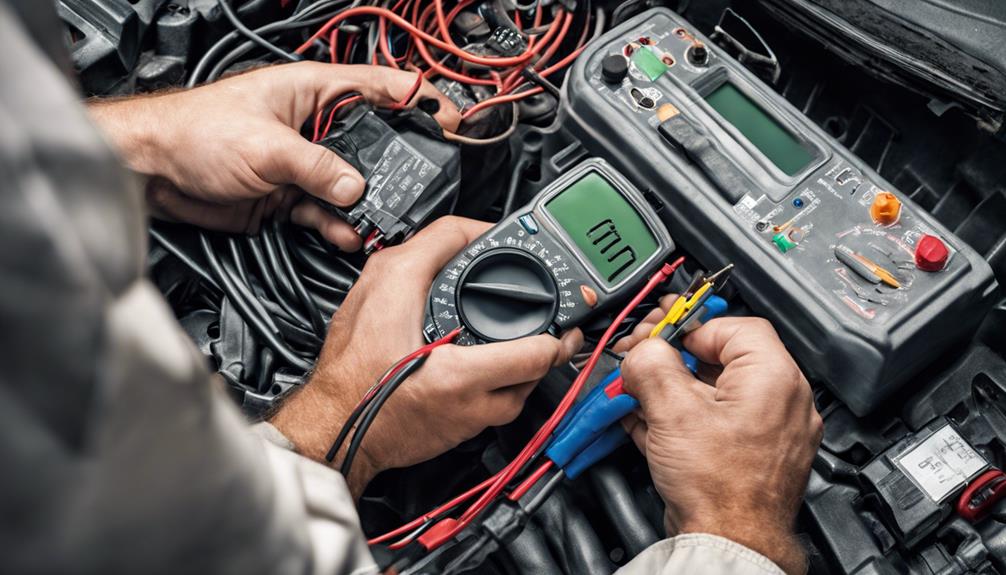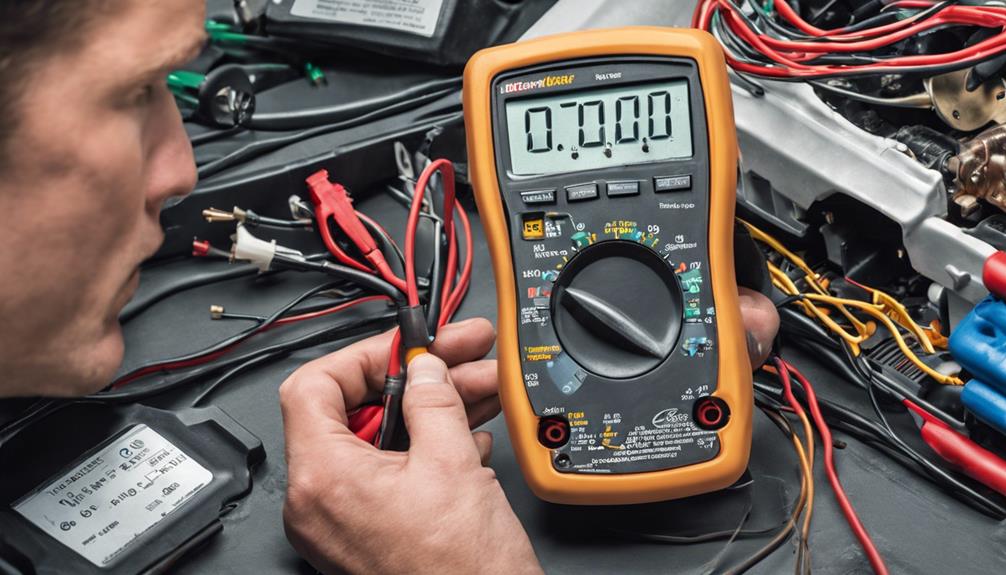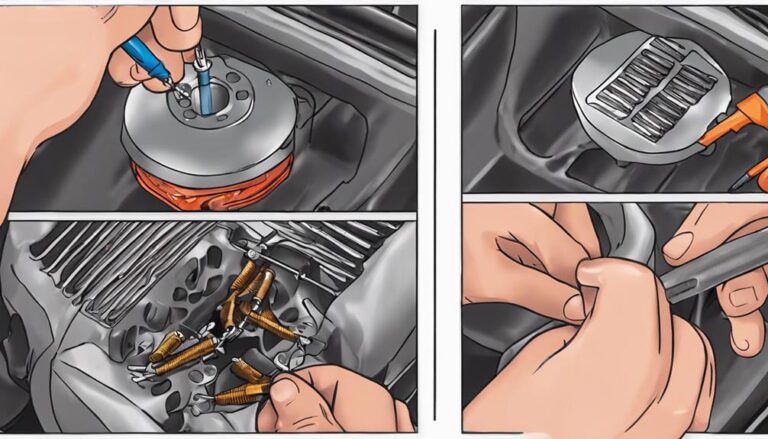What Causes Blower Motor Issues in Cars?
If you've ever wondered what could be behind the annoying blower motor issues in your car, it might surprise you to learn that a common culprit is a faulty blower motor resistor. This small yet important component plays a significant role in controlling the fan speed in your vehicle's HVAC system.
However, that's just the beginning of the story. Understanding the reasons behind blower motor problems involves a bit more detective work.
Stay tuned to uncover the other potential causes that could be affecting your car's blower motor performance.
Key Takeaways
- Reduced airflow, unusual noises, and debris can signal blower motor issues.
- Check fuse, resistor, and relay for damage or malfunction when diagnosing problems.
- Secure electrical connections and address voltage fluctuations to maintain proper fan speed control.
- Monitor voltage variations during speed adjustments and calibrate settings for efficient performance.
Common Signs of Blower Motor Issues

If you notice reduced airflow from the vents or unusual noises when the blower motor is running in your car, these are common signs indicating potential blower motor issues. Troubleshooting techniques can help diagnose the problem efficiently.
Start by checking for any debris or obstructions in the vents that could be limiting airflow. Additionally, inspect the blower motor for any visible damage or signs of wear and tear.
Regular maintenance tips such as cleaning or replacing the cabin air filter can prevent issues with the blower motor by ensuring proper airflow. It's essential to address these signs promptly to avoid further damage to the blower motor.
Ignoring these warning signs could lead to more significant problems and potentially higher repair costs down the line. By staying proactive and attentive to these common signs, you can prolong the lifespan of your blower motor and maintain peak performance in your car.
Checking the Blower Motor Fuse
To further diagnose blower motor issues in your car, inspect the blower motor fuse for any signs of damage or malfunction. Fuse troubleshooting is an important step in determining the root cause of blower motor problems. Here are three essential tasks to perform when checking the blower motor fuse:
- Visual Inspection: Begin by visually examining the fuse for any signs of a blown fuse, such as a broken filament inside the fuse or discoloration. If the fuse appears burnt or damaged, it may need to be replaced.
- Testing Continuity: By using a multimeter set to the continuity test mode, check if the fuse has continuity. If there's no continuity, it indicates that the fuse is faulty and needs to be replaced.
- Inspecting Electrical Connections: Make sure the fuse is securely connected and that there are no loose or corroded connections in the fuse box. Poor electrical connections can lead to fuse-related issues affecting the blower motor's operation.
Inspecting the Blower Motor Resistor

When inspecting the blower motor resistor, make sure that all electrical connections are secure and free of corrosion. The blower motor resistor is an important component responsible for controlling the fan speed in your car's heating and air conditioning system. One common issue that can arise with the blower motor resistor is voltage fluctuations, which can lead to inconsistent fan speeds or the fan not working at all. It's essential to check for any signs of heat damage on the resistor, such as discoloration or melted plastic, as this can indicate overheating and potential failure. Additionally, inspect the resistor for any physical damage or signs of wear that could affect its performance.
To properly inspect the blower motor resistor, locate it near the blower motor and visually inspect the component for any of the mentioned issues. If you notice any problems with the resistor, it may need to be replaced to make sure the efficient operation of your vehicle's heating and cooling system.
Testing the Blower Motor Relay
Inspecting the blower motor resistor can provide valuable insights into the health of your car's heating and air conditioning system. Now, moving on to testing the Blower Motor Relay is essential for diagnosing potential issues accurately.
When testing the Blower Motor Relay, follow these steps:
- Voltage Testing: Utilize a multimeter to measure the voltage going into and coming out of the Blower Motor Relay. This will help determine if the relay is functioning correctly and if the voltage levels are within the expected range.
- Visual Inspection: Check for any signs of corrosion, burning, or damage on the relay. These visual cues can indicate a faulty relay that needs replacement.
- Troubleshooting Techniques: If the relay tests indicate an issue, try swapping the relay with a known working one to see if the problem persists. Additionally, check the wiring and connections related to the relay for any loose connections or damage that may be affecting its performance.
Evaluating the Blower Motor Speed Control

When evaluating the Blower Motor Speed Control, analyzing the voltage variations under different settings can provide important insights into the functionality of the system. Monitoring the voltage supplied to the blower motor during speed adjustment is critical for evaluating motor efficiency. By observing how the voltage changes with each speed setting, you can determine if the motor is receiving the appropriate power for best performance.
Fluctuations in voltage could indicate underlying issues affecting the blower motor's speed control mechanism, potentially leading to decreased motor efficiency. It's essential to make sure that the voltage levels align with the manufacturer's specifications to maintain the longevity of the blower motor. Regularly checking and calibrating the speed control settings can help prevent premature wear and tear on the motor, maximizing its efficiency and lifespan.
Understanding the relationship between voltage variations and speed adjustment is key to identifying and addressing potential blower motor issues promptly.
Frequently Asked Questions
Can Blower Motor Issues Be Caused by Factors Other Than Electrical Problems?
Yes, blower motor issues can stem from factors beyond electrical problems. Mechanical wear and heat damage, along with environmental influences and vibration issues, can all contribute to blower motor malfunctions in cars.
How Often Should the Blower Motor in a Car Be Replaced?
You rely on your car's blower motor for comfort. Following a maintenance schedule is essential. Typically, replacement is needed when signs like weak airflow or unusual noises occur. Consult your technician for proper guidance.
Are There Any DIY Fixes for Common Blower Motor Issues?
When dealing with blower motor problems in your car, start with basic troubleshooting tips. Simple maintenance techniques like checking fuses and filters can often resolve issues. DIY repairs can save money if you follow a troubleshooting guide.
Can Extreme Temperatures Affect the Performance of a Car's Blower Motor?
In the domain of car systems, extreme temperatures act as relentless foes to your blower motor's efficiency. The humidity invades, the dust mars, causing the motor's performance to waver and falter.
What Are Some Potential Long-Term Effects of Ignoring Blower Motor Issues in a Car?
Ignoring blower motor issues in your car can lead to serious consequences. Health risks from poor air quality, safety concerns due to impaired visibility, increased repair costs, and potential mechanical damage are all potential outcomes of neglecting this essential component.
Conclusion
So there you have it, folks. Blower motor issues in cars can be quite the headache.
Remember to check the fuse, inspect the resistor, test the relay, and evaluate the speed control to pinpoint the problem.
But hey, if you enjoy spending your free time troubleshooting car problems, then blower motor issues are just the ticket for you.
Happy fixing!







